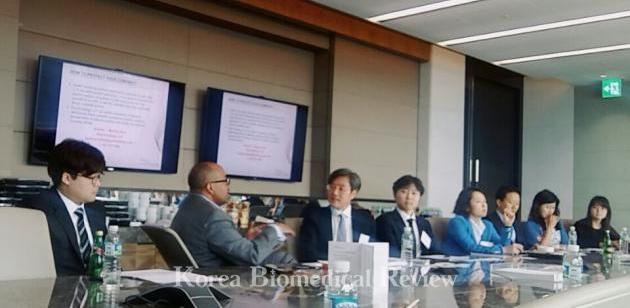The criminal and civil charges brought against Novartis Korea have directed U.S. federal agencies’ attention to the Korean pharmaceutical industry.
And the increased focus by the U.S. officials is not good news for pharmaceutical companies operating in Korea, local and foreign, which are now on the radar of three U.S. federal agencies that monitor the world for corruption and bribery.
The three U.S. federal agencies – Department of Justice, Securities and Exchange Commission, and Office of Foreign Assets Control – have begun to focus on Korea with their “expansive view of jurisdiction,” according to Kwame J. Manley, Paul Hastings’ white-collar criminal defense attorney based in Washington D.C.

Some may question why the U.S. is enforcing its anti-graft laws beyond its borders, but the U.S. Foreign Corrupt Practices Act (FCPA), designed in the 1970s by Presidents Carter and Reagan, was created for the U.S. “to play policeman around the world,” Manley said. In fact, most charges under FCPA in the past 30 years have not been against U.S. companies but non-U.S. companies, and increasingly against Asian ones, he added.
Any bribes that have U.S. nexus fall under U.S. jurisdiction, which includes phone calls, emails and bank transactions that pass through the United States.
“Every institution in the world uses the U.S. dollar at some point,” Manley said. “Even if a Korean company gives a bribe to a Korean government official in U.S. dollars, then it is considered a criminal charge in the U.S. because we have jurisdiction under FCPA.”
For Novartis, none of this is good news.
The Ministry of Health and Welfare has recently announced that it will impose a 55.1 billion won ($48 million) penalty on Novartis Korea for providing kickbacks to doctors for prescribing its medication, which has brought the U.S. federal agencies’ attention toward the Korean offshoot of the multinational pharmaceutical company.
“Novartis is in trouble,” Manley said at the Korea Pharma Industry Discussion in downtown Seoul Tuesday. “They already paid a large fine in China for carrying out pay-to-prescribe sale schemes, and now they got fined in Korea. The federal agencies are now scrutinizing their operations all over the world and asking, ‘Is this a pervasive practice in other countries?’”
“We were on a panel recently with the Federal Communications Commission (FCC), and their enforcement chief told us directly that they have been monitoring the Novartis Korea case, which indicates the Department of Justice is also looking into this,” Manley added.
However, the significance of Novartis case extends beyond just the company’s operations in Korea. In fact, the case is expected to impact the whole Korean pharmaceutical industry, he noted. “The question federal agencies’ are now asking is: If this happened at Novartis, is it happening at other multinational companies?”
The roundtable discussion at Paul Hastings revealed that the answer is yes.
According to the law firm, Teva agreed to pay a $519 million penalty in December 2016 “to settle parallel civil and criminal charges with DoJ and SEC” on bribing “foreign government in Russia, Ukraine, and Mexico.” Bristol-Myers Squibb also paid $14 million to settle charges regarding improper sales operations in China. GlaxoSmithKline likewise paid a $20 million penalty to settle SEC charges on improper sale tactics in China.
Aside from the FCPA’s anti-bribery provisions, the act’s second provision on false books and records and insufficient internal controls is even more aggressive, Manley explained.
A Korean participant agreed. “This is very scary because the issue of internal oversight has emerged in Korean companies,” said Kim Jong-han, Paul Hastings Korea’s chief representative “We have seen instances where employees have meals with outside vendors, customers or government officials who have, with the approval of the management, falsified their receipts.”
According to Manley, these pervasive actions are subject to punishment under FCPA since a lower-level employee getting quickly around the law proves internal controls are virtually ineffective.
Considering all factors, Manley suggests that Korean pharmaceutical companies take a fresh look at internal compliance structures.
“Korea has, unfortunately, a long history of inappropriate payments, particularly in the pharmaceutical industry in the form of payments to doctors and drugmakers. It is crucial to look into risk assessment,” he said.
Manley noted that when U.S. authorities evaluate companies, they tend to categorize them according to “good” and “bad” companies. The indication of a good business according to Manley: firms that look internally proactively.

